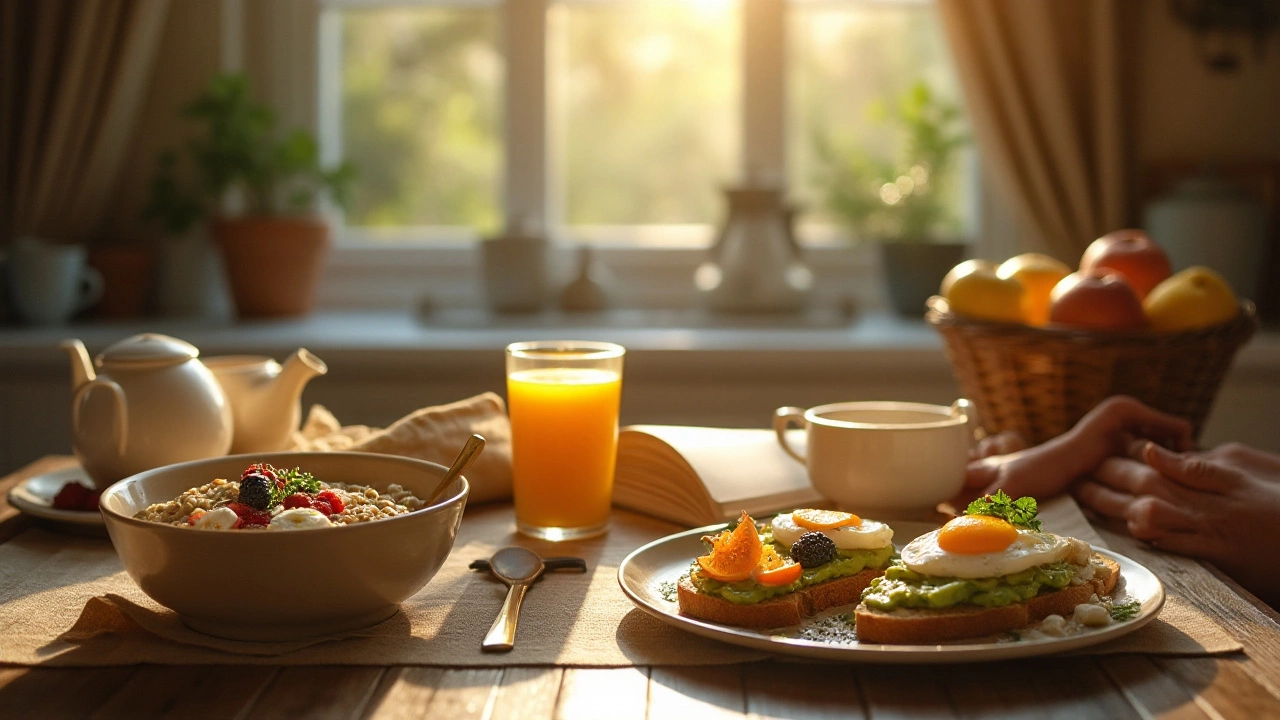They say breakfast is the most important meal of the day, and it's not an empty statement. After a long overnight fast, your body craves nourishment to kickstart its metabolism and fuel your activities ahead. What's included in your morning plate sets the tone for the rest of your day.
A healthy breakfast should strike a balance among proteins, carbs, and fats, all while being tasty enough to tempt your taste buds. But with the hustle and bustle of modern life, finding the right meal to start the day can sometimes feel like a chore.
Let's explore some practical ideas and delicious options to transform your breakfast into a powerhouse of nutrition and flavor. With a blend of the right ingredients, you can tailor each meal to your dietary needs and personal preferences, turning breakfast into a joyful beginning each morning.
- Understanding Breakfast Nutrition
- Proteins to Include
- Healthy Carbs and Grains
- Fats: Good and Bad
- Creative Breakfast Ideas
Understanding Breakfast Nutrition
When it comes to breakfast, it's often labeled as the champion among meals, laying the foundation for the whole day’s nutrition and energy. Yet, the significance of eating a healthy breakfast, the reasons go beyond just filling hungry bellies. The moment you rise in the morning, your body needs to replenish the glucose stores and provide other essential nutrients to power the brain and muscles. A balanced breakfast boosts metabolic functions and improves mental clarity, aiding in productivity and mood stabilization.
An important aspect of breakfast nutrition is its impact on our metabolism. Consuming a meal in the morning helps kickstart your metabolism, encouraging the body to burn more calories throughout the day. This phenomenon, known as the thermic effect of food, ensures that the body's digestive processes are in full swing. Including ample amounts of proteins, healthy fats, and carbohydrates ensures prolonged energy release, keeping fatigue and hunger pangs at bay.
Incorporating proteins in your breakfast can significantly improve muscle function and growth. They are vital to maintaining a strong immune system and supporting tissue repair. On the other hand, healthy fats play a role in hormone production and cellular health, while contributing to the feeling of fullness. Carbohydrates, especially whole grains, are crucial as they provide a steady energy supply. According to dietary experts, a breakfast rich in varied nutrients is tied to better eating habits throughout the day.
"A well-balanced breakfast is like the orchestra conductor that ensures all sections of your day are in harmony," notes Mary Clark, a renowned nutritionist.
Another critical element is the importance of fiber and vitamins, often sourced from fruits and vegetables. These nutrients assist in digestion and are essential for chronic disease prevention. Opting for a mix of macronutrients not only provides comprehensive energy but also can contribute to better heart health and effective weight management.
While planning this vital meal, balance is key. Navigating the multitude of options can be daunting, yet understanding the benefits of each ingredient helps create a meal that not only aligns with health goals but also tantalizes the taste buds. A simple swap, such as choosing oatmeal over sugary cereals, can make a significant difference. Consider including antioxidant-rich berries or a sprinkle of nuts for an extra bonus of nutrients.
Proteins to Include
When it comes to crafting a breakfast that truly powers up your day, the inclusion of protein is not just beneficial—it's essential. Proteins play a crucial role in repairing tissues, building muscles, and supporting various physiological functions. While eggs are a popular choice for their rich protein content, offering about six grams per large egg, they're just the tip of the iceberg. Consider diversifying your protein sources to keep your breakfast varied and exciting.
Another brilliant protein option is Greek yogurt. With twice the protein content of regular yogurt, it not only keeps you fuller for longer but also supports gut health with its probiotic properties. Cottage cheese is an equally worthy contender, delivering a creamy texture and versatile flavor profile that pairs well with fruits or seeds. If you enjoy plant-based options, don't overlook the power of quinoa. Though typically thought of as a grain, quinoa is a complete protein, making it a top choice for a nutritious breakfast.
Nuts and seeds such as almonds, chia seeds, and flaxseeds carry hefty doses of protein, along with healthy fats that keep your heart happy. These can easily be sprinkled over yogurt, oatmeal, or incorporated into smoothies. Speaking of smoothies, a scoop of protein powder can turn your morning drink into a true powerhouse. Healthy breakfast smoothies featuring a mix of fruits, greens, and protein powders are a quick and efficient start to your day.
"Breakfast without protein is like a car without gas," nutritionist Angela Lemond has noted, underscoring the importance of adding this macronutrient to each meal.
For those with more time in the morning, smoked salmon or grilled tofu can be an exquisite addition to your morning routine, providing unique flavors and textures that break the monotony. As evidence continues to highlight the role of protein in weight management and appetite control, there's never been a better time to diversify and boost your breakfast protein intake.
To visualize how much protein you're actually getting, here's a handy representation:
| Food Item | Protein (grams) |
|---|---|
| Egg (1 large) | 6 |
| Greek Yogurt (200g) | 10 |
| Cottage Cheese (100g) | 11 |
| Quinoa (1/2 cup) | 4 |
| Almonds (1 oz) | 6 |

Healthy Carbs and Grains
When we talk about healthy breakfast choices and balanced diets, healthy carbs and grains often take center stage. They are the body’s primary source of energy, and the right ones can have long-lasting benefits. Choosing the best carbs is not just about picking any food that contains carbohydrates. Whole grains are an excellent option to consider as they are rich in fiber, vitamins, and minerals, contributing significantly to our overall health.
Whole grains like oats, quinoa, and brown rice offer more than just satiety. They come with a wealth of nutritious treasures, from essential B vitamins to selenium and iron, that play a pivotal role in our daily bodily functions. Incorporating these into your nutritious meals ensures that you're not only keeping hunger at bay but also supplying your body with much-needed minerals and vitamins. Every serving comes packed with complex carbohydrates that digest slowly, providing a steady release of energy throughout the morning.
Including grains in breakfast has been associated with improved heart health and digestive function. This is thanks to the fiber content that aids in reducing cholesterol levels and regulating blood sugar. Fiber has the marvelous ability to form a gel-like substance in your stomach, slowing the absorption of sugar into the bloodstream and preventing sudden spikes. This could be your greatest weapon against the mid-morning energy slump, keeping your mood and energy levels stable. To bolster this point, a study published in The Journal of Nutrition highlights that a diet rich in whole grains can be as beneficial for heart health as medication.
The Variety of Grains
There’s a wide variety of whole grains to include in your breakfast routine. Whether you're making a warm bowl of oatmeal, indulging in a quinoa breakfast salad, or an ancient grain salad with a twist, there's something for everyone. Buckwheat, unlike what its name suggests, is gluten-free and makes for a nutritious pancake base. Farro and millet are perhaps lesser-known grains, but they bring a delightful nutty flavor and chewy texture to your morning meal, diversifying your palette while nourishing your body. Add fruits, nuts, or yogurt: the possibilities are endless, transforming these grains into culinary delights.According to the American Heart Association, 'Eating whole grains can significantly lower your risk of cardiovascular disease, especially when they replace refined grains in your diet.'
For those keeping an eye on their weight, these grains' fiber content can help manage weight by promoting a feeling of fullness. A handy trick is to use a ratio; for every serving of grain, add equal parts of lean protein, which keeps you fuller for longer and balances the macronutrient content. Morning nutrition is about more than just filling your stomach; it’s about feeding your body and mind the right balance to face the day with vigor and enthusiasm.
Fats: Good and Bad
When it comes to healthy breakfast decisions, understanding fats is crucial. Not all fats are created equal, and distinguishing between them can significantly affect your balanced diet. Good fats, also known as unsaturated fats, play a vital role in cell function, hormone production, and energy maintenance. These include monounsaturated and polyunsaturated fats, which are often found in foods such as avocados, nuts, seeds, and certain fish. They not only support heart health but also ensure your brain functions at its best.
In contrast, bad fats, primarily trans fats and saturated fats, can lead to numerous health issues. These include an increased risk of heart disease and elevated cholesterol levels. Many processed foods, baked goods, and fast food items contain these unhealthy fats. Reducing your intake of these can make a significant difference. While natural sources of saturated fats like meat and dairy can be enjoyed in moderation, trans fats offer no health benefits and should be minimized as much as possible.
Finding a good balance between these types of fats can dramatically enhance your morning routine. For those who enjoy some extra richness in their meals, try adding a teaspoon of flaxseed oil to your smoothie or topping your toast with a spread of almond butter. Both choices offer healthy unsaturated fats that will energize your morning. Morning nutrition is crucial in sustaining energy levels, and these fats can keep you satisfied longer, reducing midday hunger pangs.
According to the American Heart Association, maintaining a diet low in saturated and trans fats while including moderate amounts of the good types can help lower your chances of developing chronic diseases. Their guidelines suggest that fats should account for no more than 25 to 35 percent of your total daily calories, with an emphasis on choosing healthier fat sources.
"Replacing unhealthy fats with healthier fats can significantly improve your heart health," one study from the Harvard School of Public Health suggests.
For anyone seeking more variety, consider incorporating healthy fats through whole foods like salmon or chia seeds. These not only offer omega-3 fatty acids—a type of polyunsaturated fat beneficial for the cardiovascular system—but also enhance the nutrients in any given meal. Building a breakfast around these principles can be an enjoyable way to take care of your body right at the start of your day.

Creative Breakfast Ideas
Waking up to the same boring breakfast routine can sap the joy out of your mornings. Enter the world of creative breakfast ideas, where flavour meets nutrition in delightful, unexpected ways. Let's talk about some inventive ways to blend delicious and nutritious meals to keep your morning energy levels high. The key to a healthy breakfast lies in its variety, ensuring you're not just eating to fill but feasting to fuel. From hearty bowls to vibrant smoothies, inspiration abounds in even the simplest of ingredients.
Savory Oatmeal Bowls
Reimagine your usual sweet oatmeal with a savory twist. Oatmeal is not just for sweet fruits and honey; it pairs brilliantly with vegetables and protein. Start with your basic oatmeal, cooked or overnight, and add toppings like sliced avocado, a poached egg, and a sprinkle of crumbled feta cheese. Add a dash of salt and pepper, and you’ve got yourself a breakfast that's both warming and rich in proteins and healthy fats. This option is not only filling but also incredibly flexible. You can customize it with sautéed spinach, roasted tomatoes, or even a dollop of hummus to increase the nutrient density.
"Breakfast is everything. The beginning, the first thing. It is the mouthful that is the commitment to a new day, a continuing life," – A.A. Gill
Loaded Smoothie Bowls
Smoothie bowls have become a darling among breakfast enthusiasts for good reason—they offer a punch of nutrients in every spoonful while being totally Instagram-worthy. Begin with a base of blended fruits such as bananas and berries, and sprinkle on a selection of toppings like chia seeds, granola, sliced almonds, and a drizzle of almond butter. Not only do these bowls look stunning, but they also satisfy every craving by offering different textures and flavors. Packed with vitamins and antioxidants, they are a fantastic way to incorporate more fruits and vegetables into your diet.
Breakfast Tacos
If you desire something more hearty and packed with energy, look no further than breakfast tacos. Fill corn tortillas with scrambled eggs, black beans, pico de gallo, and avocado slices. Add a sprinkle of cheese and finish with fresh cilantro and a squeeze of lime for that tangy zest. This meal provides a balanced start with a firm presence of proteins and healthy carbs. These tacos not only make a satisfying meal but also bring a playful and vibrant approach to your daily breakfast.
With a blend of loved classics and exciting new combinations, breakfast can quickly become the highlight of your day. Engaging in creative breakfast ventures doesn't just break routine monotony; it's an invitation to explore flavors while maintaining a health-conscious mindset. Embrace these creative ideas to enjoy mornings in a new light, packed with energy and enthusiasm.
| Ingredient | Caloric Content |
|---|---|
| Oatmeal (1 cup cooked) | 150 calories |
| Smoothie (varied ingredients) | Approx 200-300 calories |
| Breakfast Taco (1 taco) | 200-250 calories |










